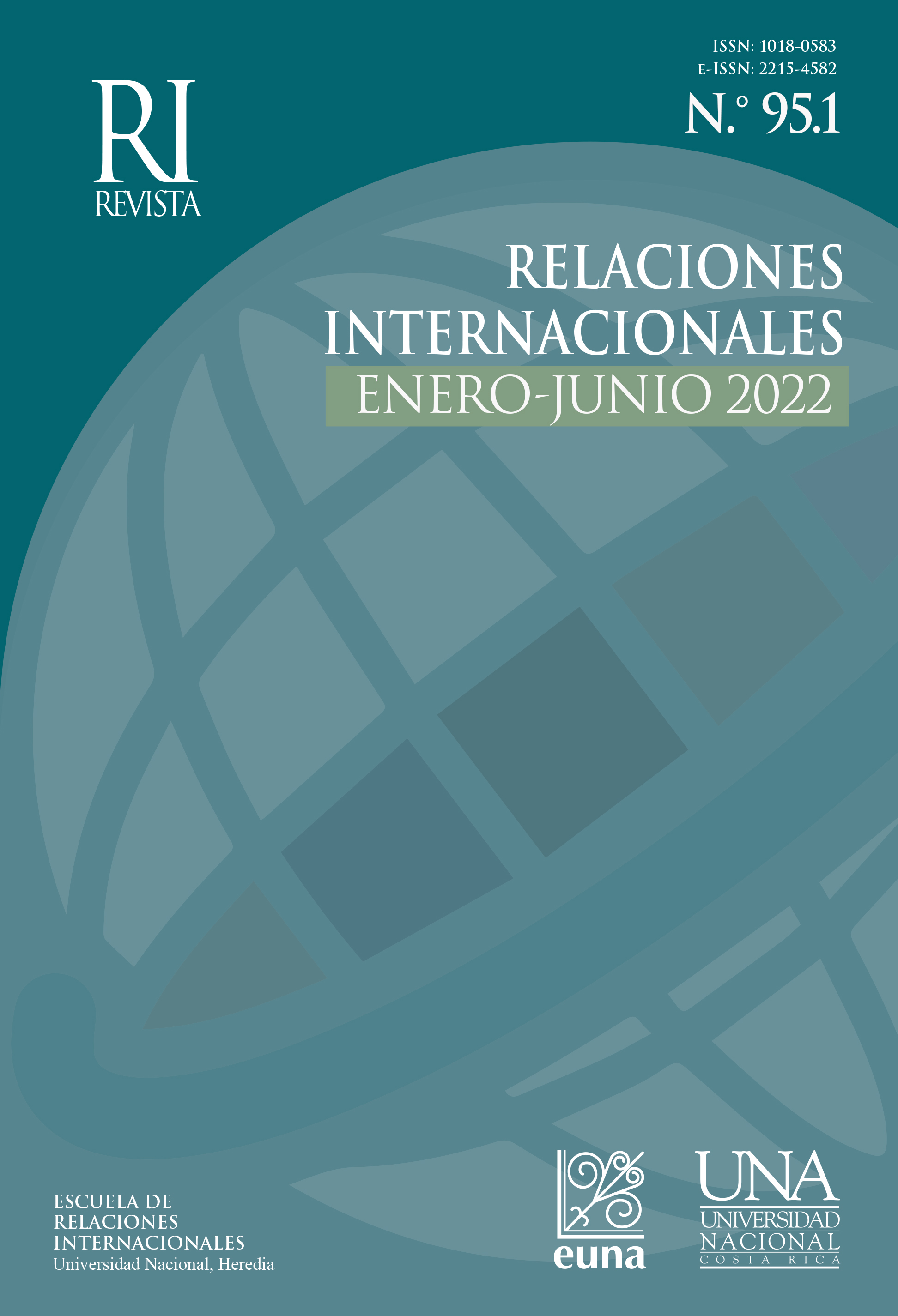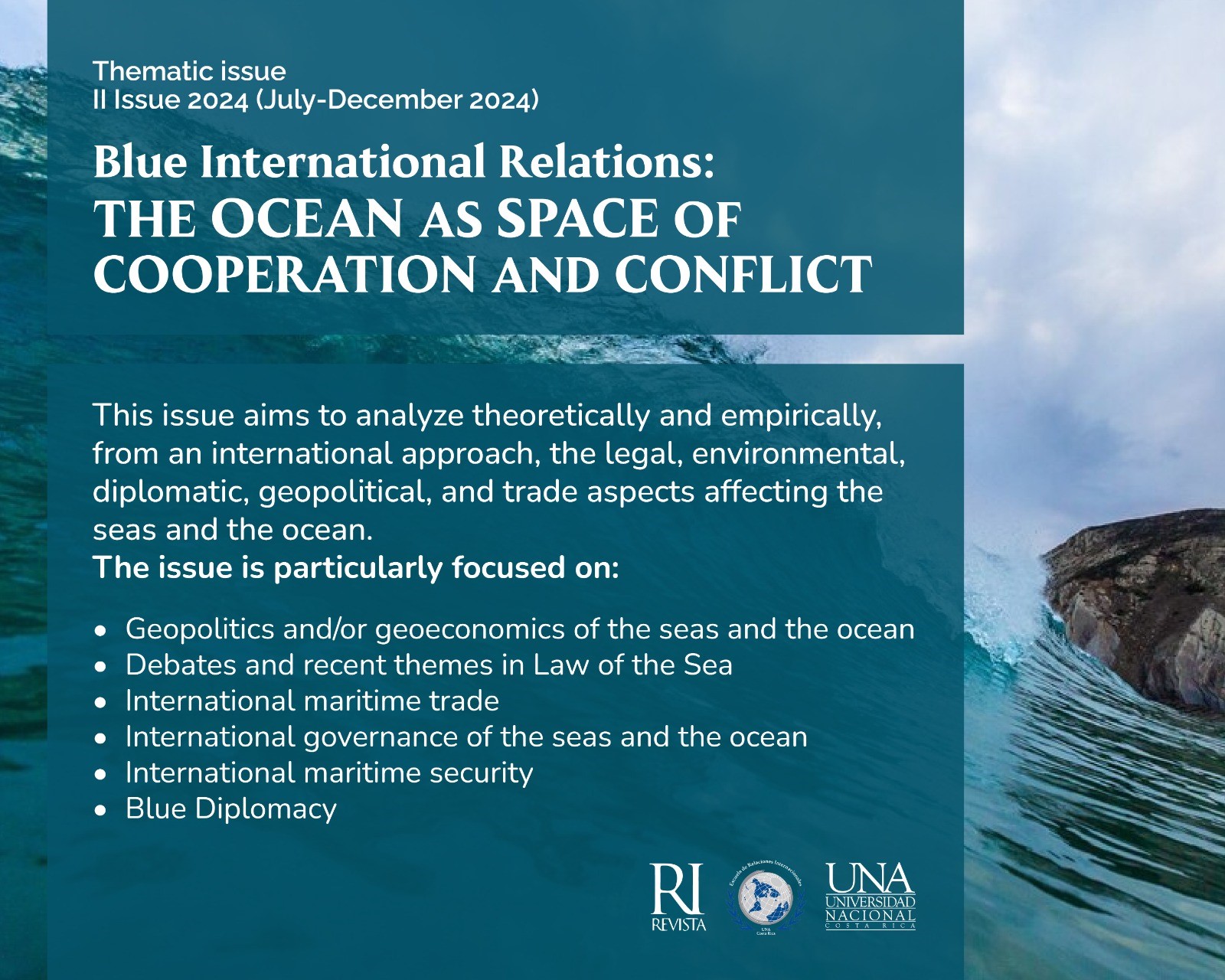The Election of a Fringe Candidate: Anomalous or Normal? The Arrival of Donald Trump to the White House in 2016
DOI:
https://doi.org/10.15359/ri.95-1.5Keywords:
Constructivism, Donald Trump, Identity, national elections, Republican Party, United StatesAbstract
Donald Trump’s 2016 successful electoral bid came as a surprise both to the public and pundits. Soon after the upset election, conventional wisdom settled on an explanation: that Trump’s victory was linked to Americans that felt left behind by globalization and the current political establishment. Conventional wisdom provided quick and straightforward answers. Nevertheless, these answers were incomplete. Chief among the missing elements of the improvised explanation was the radicalization of the Republican party. To fully understand how the transformation of the Republican Party resulted in President Trump’s election and his foreign policy, this article will analyze the case through constructivist lenses. According to this perspective, identity plays a crucial role in both domestic and international politics. By providing an analysis of American identity and especially of the identity of the Republican Party, constructivism provides useful knowledge in the interpretation of both Trump’s election and his administration’s foreign policy. We argue that what really explains Trump victory in the electoral college in the November 2016 electoral process (he lost the popular vote by about three million votes) are ideational, identity-related factors—not his personality or the globalization-related arguments conventional wisdom focuses on.
References
Alexandrov, M. (2003). The Concept of State Identity in International Relations: A Theoretical Analysis. Journal of International Development and Cooperation, 10(1), 33 - 46.
Andrew Mercer, C. D. (2016, 9 de noviembre). Why 2016 elections polls missed their mark. Pew Research Center. https://www.pewresearch.org/facttank/2016/11/09/why-2016-election-polls-missed-their-mark/
Balz, D. (2016, 5 de marzo). How the Republican Party created Donald Trump. The Washington Post. https://www.washingtonpost.com/politics/behind-the-rise-of-trump-long-standing-grievances-among-left-out-voters/2016/03/05/7996bca2-e253-11e5-9c36-e1902f6b6571_story.html
Banchoff, T. (1999). German Identity and European Integration. European Journal of International Relations, 5(3), 259-289.
Benen, S. (2015, 5 de mayo). Biggest. Field. Ever. MSNBC. http://www.msnbc.com/rachel-maddow-show/biggest-field-ever
Berger, J. (2016, 25 de octubre). How White Nationalists Learned To Love Donald Trump. Politico. https://www.politico.com/magazine/story/2016/10/donald-trump-2016-white-nationalists-alt-right-214388
Bloom, W. (1993). Personal Identity, National Identity and International Relations.Cambridge: Cambridge University Press.
Bridge, S. (2019, 19 de febrero).What is Conventional Wisdom?Business First.https://www.businessfirstonline.co.uk/articles/what-is-conventional-wisdom/
CBS/AP. (2016, 25 de octubre). State of the presidential race two weeksfrom Election Day. CBS News. https://www.cbsnews.com/news/election-2016-state-of-the-presidential-race-two-weeks-from-election-day/
Cook, N. (2016, 8 de abril). Cruz would be the most conservative nominee in generations. Politico. https://www.politico.com/story/2016/04/ted-cruz-most-conservative-republican-nominee-221729
Cox, D., Lienesch, R., & Jones, P. (2017). Beyond Economics: Fears of Cultural Displacement Pushed the White Working Class to Trump | PRRI/The Atlantic Report. PRRI. https://www.prri.org/research/white-working-class-attitudes-economy-trade-immigration-election-donald-trump/
Edwards, L. (2014, July 03). Barry M. Goldwater: The Most Consequential Loser in American Politics. The Heritage Foundation: https://www.heritage.org/political-process/report/barry-m-goldwater-the-most-consequential-loser-american-politics
Enten, H. (2016, 27 de abril). Ted Cruz May Be Too Conservative To Stop Trump. FiveThirtyEight. https://fivethirtyeight.com/features/ted-cruz-may-be-too-conservative-to-stop-trump/
Golob, S. R. (2002). North America Beyond NAFTA? Sovereignty, Identity, and Security in Canada-U.S. Relations. Canadian-American Public Policy, (52), 1-44
Grunwald, M. (2016, 16 de marzo). What We Missed About Rubio. Politico. https://www.politico.com/magazine/story/2016/03/marco-rubio-2016-wrong-predictions-213739
Guillaume, X. (2010). International Relations and Identity. A dialogical approach. Londres-Nueva York: Routledge.
Hetherington, M. J. (2018). The Election. The Allure of the Outsider. In M. Nelson (ed.), The Elections of 2016 (pp. 63 - 86). London, England: Sage.
Hopf, T. (1998). The Promise of Constructivism in International Relations Theory. International Security, 23(1), 171 - 200.
Kabaservice, G. (2012). The Downfall of Moderation and the Destruction of the Republican Party, from Einsenhower to the Tea Party. Oxford, UK: Oxford University Press.
Katzenstein, P. J. (2012). Perspectivas alternativas de seguridad nacional. In A.Santa Cruz (Ed.), La política sin fronteras o la ubicuidad de lo distinto (pp.171 - 212). Centro de Investigación y Docencia Económica, A. C.
Katzenstein, P. J. (1996). The Culture of National Security: Norms and Identity in World Politics. Columbia University Press.
Klein, E. (2017, 5 de junio). The mystery of the 2016 election was its normalcy. Vox. https://www.vox.com/policy-and-politics/2017/6/5/15161442/2016-electionnormalcy-democracy-realists-identity
Knoblauch, M. (2015, 16 de junio). All the times Donald Trump has pretended to run for president. Mashable. https://mashable.com/2015/06/16/donald-trump-president-fake/
Krugman, P. (2018, 19 de noviembre). The New Economy and the Trump Rump. The New York Times. https://www.nytimes.com/2018/11/19/opinion/economytrump-red-blue-states.html
Krugman, P. (2018, 1 de octubre). The Angry White Male Caucus.The New York Times. https://www.nytimes.com/2018/10/01/opinion/kavanaugh-white-male-privilege.html
Lopez, G. (2016, 14 de octubre). Actual white supremacist: Trump’s success “proves that our views resonate with millions”. Vox. https://www.vox.com/policy-and-politics/2016/10/14/13287532/trump-white-supremacists-racists
Lopez, G. (2017, 15 de diciembre). The past year of research has made it very clear: Trump won because of racial resentment. Vox. https://www.vox.com/identities/2017/12/15/16781222/trump-racism-economic-anxiety-study
Mayer, W. G. (2018). The Nominations: The Road to a Much-Disliked General Election. In M. Nelson, The Elections of 2016 (pp. 29 - 63). London, U.K.: Sage.
Nau, H. R. (1993). Identity and International Politics: An Alternative to Neorealism. Annual Meeting of the American Political Science Association, Washington DC.
Nelson, M. (2018). The Setting: Broadenind the Presidential Talent Pool - for Better
and Worse. In M. Nelson (ed). The Elections of 2016 (pp. 1 - 29). Sage.
Pew Research Center (2018, 9 de agosto). An examination of the 2016 electorate, based on validated voters. Pew Research C e n t e r. h t t p s: // w w w. p e w r e s e a r c h . o r g / p o l i t i c s / 2 018 / 0 8 / 0 9/ an-examination-of-the-2016-electorate-based-on-validated-voters/
Porter, E. (2020, 27 de enero). How the G.O.P. Became the. The New York Times. https://www.nytimes.com/interactive/2020/01/27/business/economy/republican-party-voters-income.html
New York Times. (2017, 9 de agosto). Presidential Election Results: Donald J. Trump Wins. The New York Times. https://www.nytimes.com/elections/2016/results/president
Rozsa, M. (2019, 5 de julio). How did the Republican Party become so conservative? Salon. https://www.salon.com/2019/07/05/how-did-the-republican-party-become-so-conservative/
Ruggie, F. K. (2009). La organización internacional. Un estado del arte sobre un estado del Estado. In A. Santa Cruz (ed). Constructivismo y las relaciones internacionales (pp. 41 - 72). Centro de Investigación y Docencia Económicas.
Ruggie, J. G. (1997). The Past as Prologue? Interests, Identity, and American Foreign Policy. International Security, 21(4), 89-125.
Santa Cruz, A. (2009). “Integración regional, soberanía e identidad en América del Norte”. En R. Benítez, A. Rodríguez & A. Rodríguez (Eds.), Atlas de la seguridad y la defensa de México 2009 (pp. 223-227). CASEDE.
Santa Cruz, A. (2012). Introducción. Peter J. Katzenstein: La política sin fronteras o la ubicuidad de los distintivo. In A. Santa Cruz (Ed.), La política sin fronteras o la ubicuidad de los distintivo (pp. 13 - 33). Centro de Investigación y Docencia Económica, A. C.
Santa Cruz, A. (2014). Constructivismo. In T. Legler, A. Santa Cruz & L. Zamudio (ed.) Introdución a las relaciones internacionales. América Latina y la política global (pp. 36 - 50). Oxford University Press México.
Sides, J., Tessler, M., & Vavreck, L. (2018). Identity Crisis. Princeton University Press.
Turner, O. (2013). ‘Threatening’ China and US security: the international politics of identity. Review of International Studies, 39(4), 903-924.
Velasco, J. (2016). La derecha radical en el Partido Republicano. De Reagan a Trump. Fondo de Cultura Económica.
Weldes, J. (2009). La construcción de los interes nacionales. In A. Santa Cruz (Ed.), El constructivismo y las relaciones internacionales (pp. 367 - 417). Centro de Investigación y Docencia Económicas.
Wendt, A. (2009). La anarquía es lo que los Estados hacen de ella: La construcción social de la política del poder. In A. Santa Cruz (Ed.), El constructivismo y las relaciones internacionales (pp. 125 - 174). Centro de Investigación y Docencia Económica.
Wendt, A. (1994). Collective Identity Formation and the International State. American Political Science Review, 88(2), 384-396.
Zezima, K., & Fahrenthold, D. A. (2015, 23 de marzo). Ted Cruz: ‘I am running for president of the United States’. The Washington Post. https://www.washingtonpost.com/news/post-politics/wp/2015/03/23/ted-cruz-announces-presidential-run/?arc404=true
Downloads
Published
How to Cite
Issue
Section
License

Revista de Relaciones Internacionales por Universidad Nacional de Costa Rica está bajo una Licencia Creative Commons Atribución-NoComercial-SinDerivar 4.0 Internacional








1.png)







3.png)
